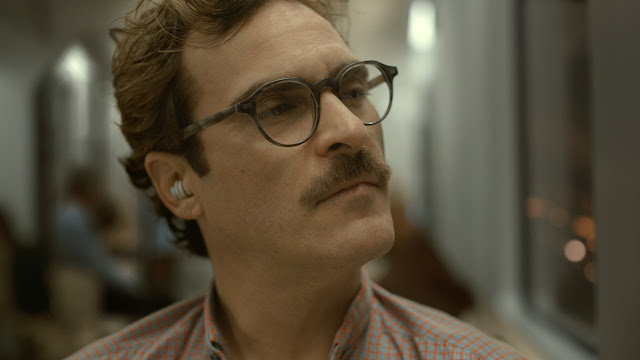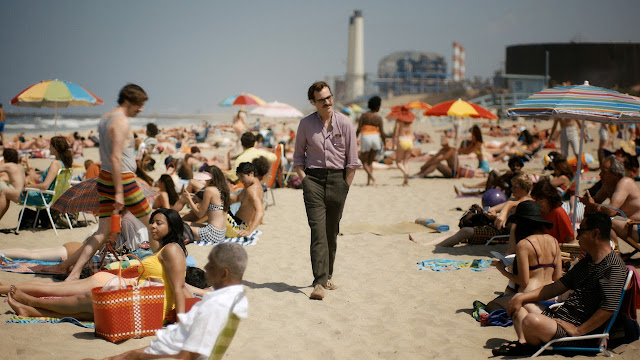Spike Jonze's Her Reviewed
“It’s good to be around someone that’s excited about the world. I forgot that existed.”
Spike Jonze has seen the future and it is very convenient. Her depicts a near-future L.A. that appears to have been annexed by Apple. The digital citizens of this pastel utopia conduct most of their daily activity through virtual space, appear to want for nothing and work at professions that balance creativity with profit, and wear very high pants. The film takes place in an almost insufferably middle-class setting, absent any hint of conflict or deprivation.
Theodore Twombly (Joaquin Phoenix) is introduced reading aloud what appears to be a touching love letter. Then comes the reveal that Theodore writes correspondence for a living, occasionally managing both sides of an intimate conversation between the loved ones who employ him. His computer translates his spoken words into beautiful long-hand writing on a printed page, which is then forwarded on to the addressee. The simple act of letter-writing has become fetishised and transformed into a business transaction.
Lonely following the breakdown of his own marriage, the instinctively empathetic Theodore installs a new form of household Operating System that emotionally anticipates the needs of the user and develops an independent artificial intelligence. It is in this fashion he first ‘meets’ Samantha (Scarlett Johansson), whose infectious enthusiasm for life and can-do attitude helps lift Theodore’s funk. Quickly progressing from organising his work life to encouraging the shy writer to go on blind dates, a genuine friendship soon develops between the two.
Having put in the work establishing just how abstract human relationships have become – there’s an awfully funny anonymous cybersex scene featuring Kristin Wiig – Theodore and Samantha falling for one another feels completely natural. Somehow in grafting his story on to a science fiction setting, Jonze has managed to produce a startlingly insightful conversation about how we communicate with one another, both generally and within relationships.
Spike Jonze has seen the future and it is very convenient. Her depicts a near-future L.A. that appears to have been annexed by Apple. The digital citizens of this pastel utopia conduct most of their daily activity through virtual space, appear to want for nothing and work at professions that balance creativity with profit, and wear very high pants. The film takes place in an almost insufferably middle-class setting, absent any hint of conflict or deprivation.
Theodore Twombly (Joaquin Phoenix) is introduced reading aloud what appears to be a touching love letter. Then comes the reveal that Theodore writes correspondence for a living, occasionally managing both sides of an intimate conversation between the loved ones who employ him. His computer translates his spoken words into beautiful long-hand writing on a printed page, which is then forwarded on to the addressee. The simple act of letter-writing has become fetishised and transformed into a business transaction.
Lonely following the breakdown of his own marriage, the instinctively empathetic Theodore installs a new form of household Operating System that emotionally anticipates the needs of the user and develops an independent artificial intelligence. It is in this fashion he first ‘meets’ Samantha (Scarlett Johansson), whose infectious enthusiasm for life and can-do attitude helps lift Theodore’s funk. Quickly progressing from organising his work life to encouraging the shy writer to go on blind dates, a genuine friendship soon develops between the two.
Having put in the work establishing just how abstract human relationships have become – there’s an awfully funny anonymous cybersex scene featuring Kristin Wiig – Theodore and Samantha falling for one another feels completely natural. Somehow in grafting his story on to a science fiction setting, Jonze has managed to produce a startlingly insightful conversation about how we communicate with one another, both generally and within relationships.
Theodore and Samantha may seem like an unlikely couple and at first there’s a suspicion that she is merely behaving affectionately towards him due to her programming. However, the film explores just how dynamic this form of artificial intelligence is. Samantha is not only developing as a piece of software, but discovering her own personhood. Part of the charm of the film is showing how the couple get to know each other more and become genuinely intimate – with all the attendant joys and fears that treasured intimacy brings. Samantha’s arc is that she continues to grow not only into the relationship, but as an individual with wants and needs. Theodore, in his own right, is pulled back into the world, having become insulated by his retreat into technology.
His growing acceptance of Samantha as an individual with her own personality, desires and dreams resembles many relationships. The initial attraction based on a pre-existing preference of what a person is looking for in a partner and then the growing intimacy that comes with truly getting to know someone.
His growing acceptance of Samantha as an individual with her own personality, desires and dreams resembles many relationships. The initial attraction based on a pre-existing preference of what a person is looking for in a partner and then the growing intimacy that comes with truly getting to know someone.
Another sign of how smart a piece of writing this is can be found in the surrounding characters. Chris Pratt - soon to be appearing on the big screen as Marvel’s next superhero Starlord in Guardians of the Galaxy - features as an easy-going and emotionally secure colleague of Theodore’s. Pratt’s performance as Paul is not only wryly humourous, but sweet-natured and accepting of difference. Olivia Wilde’s ‘Blind Date’, however, is far more fragile, terrified of disappointment in her relationships. Amy Adams plays an old friend of Theodore’s who calmly accepts the highs and lows of life with philosophical grace. Courtesy of both the quality of acting, and the natural dialogue, these characters do not feel like stodgy archetypes. There’s a rich degree of observational insight at work here.
This is also a film that simply looks fantastic. Hoyte Van Hoytema’s cinematography is a wonder, transforming the locations of Shanghai and docklands LA into pristine and richly coloured vistas. Like Michael Winterbottom’s Code 46, or Godard’s Alphaville, this is a stunning example of practical futurism. Very little special effects or green-screen work is in evidence here, besides Theodore’s very funny playtime sessions with a foul-mouthed video-game avatar.
Throw in a soundtrack by Arcade Fire and you have yourself a remarkable multimedia experience.
Her is a film that thrives not only on its performances, courtesy of the intimacy of Phoenix and Johansson’s conversations, but the subtle play of ideas in Jonze’s script. Quite simply one of the most compelling recent films released.
Her is in cinemas from tomorrow - 16 January.
Her is in cinemas from tomorrow - 16 January.








0 comments:
Post a Comment